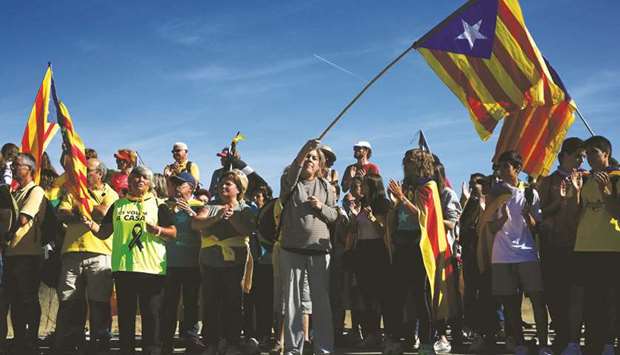Spain’s government was yesterday preparing a response to the violent protests which have rocked Catalonia over the jailing of nine separatist leaders for their role in a failed 2017 independence bid.
Scores of people have been hurt and dozens arrested in two nights of clashes between protesters and police in Barcelona and other Catalan cities.
Angry demonstrations erupted across the region after Spain’s Supreme Court yesterday handed heavy prison terms to nine leaders convicted of sedition for holding a banned referendum then issuing a short-lived declaration of independence.
The convictions revived tensions in the wealthy northeastern region, split between Catalans who want independence and those who want the region to remain part of Spain.
In Barcelona late on Tuesday, police charged at hundreds of demonstrators – many of them masked – who hurled projectiles at the security forces and set fire to rubbish bins and cardboard boxes. The wave of protests continued yesterday as thousands of demonstrators departed on foot along highways from five cities towards Barcelona. They planned to gather there on Friday, when unions have called a general strike in the region. Further rallies will also be held in Barcelona and other cities. Socialist Prime Minister Pedro Sanchez was yesterday holding emergency talks with opposition leaders to prepare his government’s response to the unrest. Sanchez, who has in the past raised the possibility of suspending Catalonia’s autonomy as his conservative predecessor did in 2017, “does not rule out any scenario”, his office said.
Speaking after talks with Sanchez, the leader of the main conservative opposition Popular Party, Pablo Casado, urged the government to take a harder line to stop the “inadmissible escalation of violence”. Sanchez was also to meet leaders of the centre-right Ciudadanos and far-left Podemos.
The court ruling thrust the Catalan dispute to the heart of the political debate ahead of Spain’s November 10 general election, its fourth in as many years.
Officials said 125 people were injured in the overnight protests, including 72 police officers, some with broken bones. Police also arrested 29 people in the province of Barcelona, 14 in Tarragona province and eight in Lleida, the interior ministry said.
On Monday, about 10,000 people blocked access to Barcelona airport, Spain’s second busiest, for several hours. Riot police charged at the crowd on several occasions using batons and firing foam balls to prevent a forced mass entry. The emergency services said 115 people were injured at the airport, including a protester who lost sight in one eye.
The unrest prompted Spain’s football league yesterday to ask the Spanish Football Federation to move a clash between arch-rivals Barcelona and Real Madrid on October 26 from Barcelona to Madrid.
The violent protests marked a break with the mainly peaceful and festive pro-independence rallies which have been held in Catalonia since the separatist movement gained momentum nearly a decade ago.
While Catalan president Quim Torra has encouraged Catalans to exercise civil disobedience, his government is also responsible for the regional police who are charged with controlling demonstrations, putting him in an uncomfortable position. In an interview with Catalan television yesterday, Interior Minister Fernando Grande-Marlaska urged Torra to “clearly” condemn the “serious acts of violence which took place yesterday in Catalonia’s main cities”. Torra was asked about the clashes yesterday as he took part in the protest march from Girona to Barcelona, but declined to comment.
Instead he condemned the “sham verdicts of a sham trial” against the Catalan separatist leaders. The marches towards Barcelona cut off roads across Catalonia. Volunteers in yellow jackets handed out bottles of water and apples to the protesters, many of them carrying Catalan separatist flags. “It’s a great show of force. We shouldn’t stop,” said 25-year-old student Jordi Soler, who was marching from Girona, a separatist bastion.
This demonstration “is very peaceful and that’s good... even if sometimes you have to more forceful,” he added in a nod to the clashes in Barcelona.

Protesters wave Catalan pro-independence u201cEsteladau201d flags as they march on the Nacional 2 road in Sils, near Girona, yesterday.
